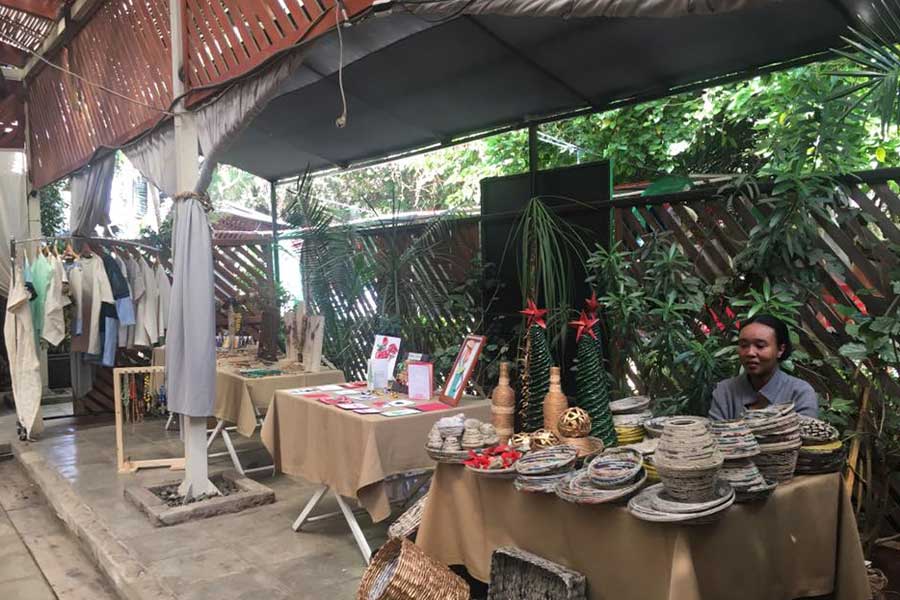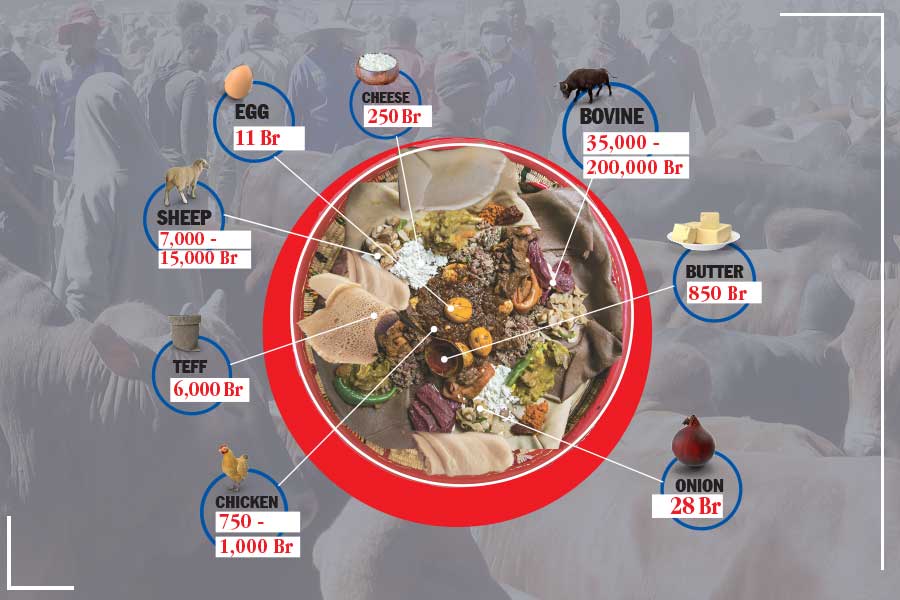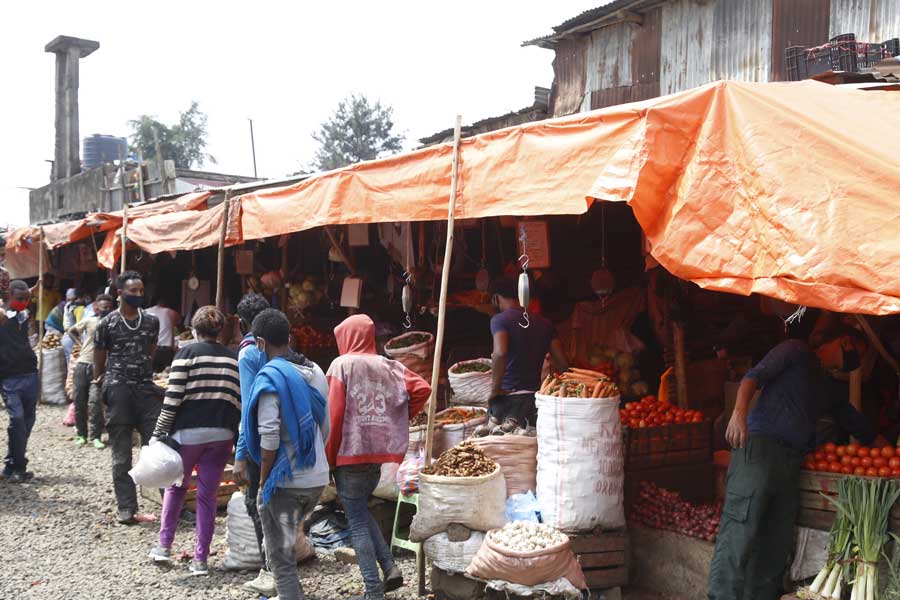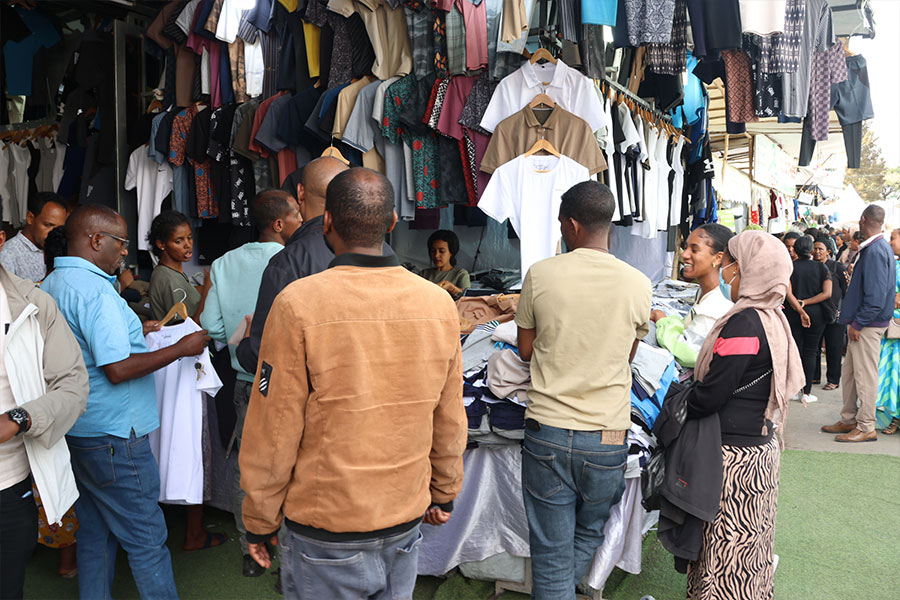
Radar | Nov 21,2018
Abdulkarim Murad, 23, vehemently bargains the price of sandals with the vibrant vendor that matches the energy while simultaneously dealing with many customers. He arrived at the Merkato area with plans to buy a holiday gift for his father.
He recalls the same type of pair was sold for 1,400 Br a couple of months ago when he bought one for himself, accusing the vendor of attempting to garner windfall profits by capitalizing on the holiday demand. The vendor argues that the price hike should not be pinned on them but rather the inflation that cast its shadow on every business.
After a long and hard negotiation, Abdulkarim settled at 2,000 Br.
”Holiday shopping has become difficult,” he told Fortune.
Last week saw the labyrinth world of the Merkato area choked with drivers honking car horns to pass through shoppers hovering around to reach their destination. The open market is a popular destination to find products at lower prices and a wide range of alternatives with business transactions hyped up as the holy month of Ramadan draws to an end.
The climactic moment for business activities during the Eid holiday week appears to be for blocks occupied by garments, clothing and accessory vendors.
Imported rugs and carpets from Turkey and Dubai were among the top home appliances in demand around the Anwar Mosque, the hub for the retail and distribution of carpets. However, things seem to go awry as salespersons were seen out on the road persisting passerby to check out their shops.
Hijab and Abaya boutique in Yirga Haile Commercial Center .
Shemsu Mustafa, who worked as a salesman for about eight years is one of the relentless callers with his shop filled with rolled rugs in various sizes. He said the holy month is the most lucrative one where their business thrived the previous years. However, he is dismayed over the slow market this year that unfolded in an unprecedented manner.
"My sales went down abruptly," he told Fortune.
Shemsu is apprehensive about the shoppers who seldom visit the shop and go back out after checking the price tags. He believes such instances are vivid marks of the inverse proportionality between the price and purchasing power.
The newlyweds Musin Kedir and Mekiya Hassan hoped to roll out a brand new 3x4 rug in their home for their first holiday together.
They visited over three shops only to learn the unfortunate news of one square metre showing an 800 Br rise from last year. They eventually decided to buy other home appliances than spend lavishly on aesthetics.
"Holiday shopping is no more exciting," said Mekiya.
Less than a kilometre away lies the Yirga Haile Market Centre as an alternative for holiday shoppers looking for gifts and clothing. The blistering Menzuma from the speakers has overshadowed the chatters of traders casting a holiday vibe.
Corridors are flooded with shoppers of all ages compelled by the narrow shops selling Abayas and Hijabs while some wait outside the doors until customers negotiate with vendors and vacate the premise.
Ikram Ahmed, in her late 20s, rushed outside from one of the shops with a wrapped plastic bag and a victorious smile, implying that the negotiation seemed to have worked in her favour.
She bought two hijabs for 7,000 Br. Even though the price has significantly increased from last year, Ikram considers Merkato a relatively better marketplace than fancy malls selling a similar product for a hefty price.
The seller, Foziya Hussein imports the garments from the Middle East and Turkey. Her tiny boutique is fully packed with customers waiting their turn to start negotiations. She admits the price has seen a major rise with a modest Abaya which was sold for 4,000 Br last year now reaching 6,000 Br. However, according to Foziya, the price hike is inevitable following the exchange rate.
Although the shops are relatively less crowded, the men’s corner was also not immune to the increased price.
The refined version of the Jalabiya robe ranges between 3,000-5,000 Br while lower-quality fabrics imported from Pakistan are sold within the price range of 1,800-2,500 Br.
Leaving the market centre spectacle, street vendors filled the streets selling sweets, clothing and electronics.
Fedila Hayru, a newcomer to the busiest hub sells frankincense calling for customers with its pleasing aroma. She said the market so far is not going well contrary to her expectation. Alongside her are a series of vendors selling round caps and scarfs, Taqiyah and Imama with a 50 Br minimal price increase from last year.
According to Fedila, the inflation that tightly grips purchasing power becomes so imminent on vendors selling products that are not often priorities.
One of the essential staples during the holy month is the only product showing a decline as the holiday nears. Consuming dates after a daylong fasting does not merely satisfy the craving for sweets but rather has a religious intent. The retail price of date during the fasting season doubled from last year, with 10kg being sold for up to 2,800 Br.
Many ascribe the price disparity to the unmatched demand and supply caused by a lack of forex access and fear of market surplus. Abdu Mohammed, importer and wholesaler, claims to have had an ample supply in the market last year that lowered the price up to 1,200 Br, entailing a huge loss as the fasting season comes to an end.
Importers claim the foreign currency squeeze and the 'vague' regulation passed by the council of ministers a couple of months ago, to curb forex exchange spending on items labelled as luxury goods is the main reason behind the shortage of supply witnessed in the market.
The inclusion of dates among processed sweets in the regulation ratified a couple of months ago is used as a pretext by financial institutions to deny foreign currency does not seem plausible for many importers considering the product is an instrumental staple in every Muslim household during the holy month.
Zeynu, an importer, understands the government's regulations to use the scarce foreign currency reserve efficiently. However, he recommends a relaxation on the prohibition imposed on certain items such as dates on a timely basis taking its importance into account during the holy month.
PUBLISHED ON
Apr 22,2023 [ VOL
24 , NO
1199]

Radar | Nov 21,2018

Radar | May 06,2023

Radar | Sep 04,2021

Featured | Jan 05,2020

Fortune News | Jan 07,2023

Fortune News | Aug 08,2020

Covid-19 | Jan 30,2021

Featured | Apr 19,2025

My Opinion | Dec 25,2021

Fortune News | May 17,2025

Dec 22 , 2024 . By TIZITA SHEWAFERAW
Charged with transforming colossal state-owned enterprises into modern and competitiv...

Aug 18 , 2024 . By AKSAH ITALO
Although predictable Yonas Zerihun's job in the ride-hailing service is not immune to...

Jul 28 , 2024 . By TIZITA SHEWAFERAW
Unhabitual, perhaps too many, Samuel Gebreyohannes, 38, used to occasionally enjoy a couple of beers at breakfast. However, he recently swit...

Jul 13 , 2024 . By AKSAH ITALO
Investors who rely on tractors, trucks, and field vehicles for commuting, transporting commodities, and f...

Oct 18 , 2025
The political establishment, notably the ruling party and its top brass, has become p...

Oct 11 , 2025
Ladislas Farago, a roving Associated Press (AP) correspondent, arrived in Ethiopia in...

Oct 4 , 2025
Eyob Tekalegn (PhD) had been in the Governor's chair for only weeks when, on Septembe...

Sep 27 , 2025
Four years into an experiment with “shock therapy” in education, the national moo...